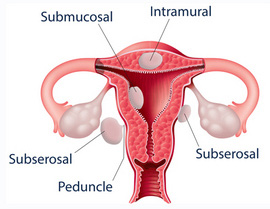Fibroid Link to Miscarriage Now in Doubt
The largest study of its kind revealed that women with fibroid tumors are not at increased risk of miscarriage, contradicting common beliefs of women and health-care providers. The findings, reported in the June 7, 2017, issue of the American Journal of Epidemiology, may reduce unnecessary surgery for women with fibroids who plan to become pregnant. (Am J Epidemiol DOI:10.1093/aje/kwx062)
The findings of NIH reproductive epidemiologist Donna Baird and collaborators at Vanderbilt University Medical Center (Nashville) did not support earlier studies that suggested a fibroid’s alteration of uterine shape or size was a risk factor for miscarriage.

PHOTO BY STEVE MCCAW, NIEHS
NIEHS Senior Investigator Donna Baird—who researches fertility, early pregnancy, and the epidemiology of uterine fibroids—was one of the authors of a study that found that women with fibroid tumors are not at increased risk of miscarriage, contradicting common beliefs of women and health-care providers.
“The paper convincingly counters accepted dogma because it is based on such a well-designed and well-conducted study—the Right from the Start study,” said Baird, who is a senior investigator in the National Institute of Environmental Health Sciences (NIEHS) and head of the NIEHS Women’s Health Group. Right from the Start: A Study of Early Pregnancy was funded by the Eunice Kennedy Shriver National Institute of Child Health and Human Development.
Fibroid tumors in the uterus are benign growths that occur more frequently as women get older. The authors explained that until now, scientists thought that the location or size of a fibroid could interfere with attachment of the embryo, contraction of the uterus, or function of the placenta. As a result, surgery may be recommended for women with fibroids before they attempt to get pregnant, especially if a previous pregnancy ended in miscarriage.
Yet when the more than 5,500 women enrolled were divided into two groups, based on whether or not fibroids were detected in ultrasounds, the team observed the same rate of miscarriage in both groups—11 percent. The authors advised that surgical removal of fibroids to reduce risk of miscarriage should receive careful scrutiny.
“Women with fibroids had identical risk of miscarriage as women without fibroids, when taking into account other risks for pregnancy loss,” reported Vanderbilt scientist Katherine Hartmann, who led the study, in a Vanderbilt press release. “We were stunned.”

CREDIT: NICHD
Uterine fibroids are growths made of smooth muscle cells and other tissue that develop within the wall of the uterus. Most fibroids range from about the size of a large marble to slightly smaller than a baseball. Fibroids are categorized based on where in the uterine wall they grow.
Her reaction hints at how deeply the conventional wisdom about fibroids and pregnancy is held among health professionals. Yet, according to the authors, the study confirmed several meta-analyses of clinical trials, one as recent as 2012, which found that removing fibroids had no effect on rates of miscarriage.
The authors suggested several reasons for the surprising findings.
- Unlike researchers in earlier studies, the team used research ultrasound to systematically document the fibroid status of all participants.
- The research team enrolled a large, racially diverse group of women, living in and near eight cities across three states.
- Their statistical analyses accounted for age and race, because fibroids increase with age, and African-American women experience a higher prevalence of fibroids.
“This study addressed an important question with state-of-the-art methods,” said Dale Sandler, chief of the NIEHS Epidemiology Branch. “The authors carefully considered all potential challenges to the validity of their findings, concluding rightly that their work calls into question a long-held belief in clinical practice.”
Watch a video (3:53 minutes) of Hartmann discussing the new study.
This page was last updated on Friday, April 8, 2022
